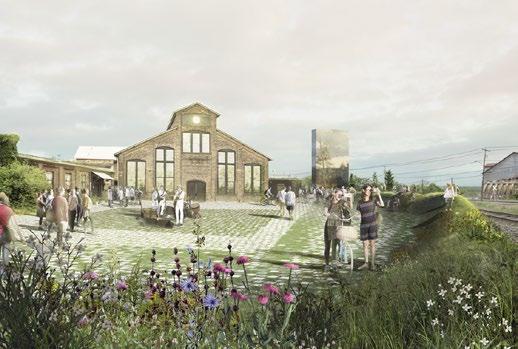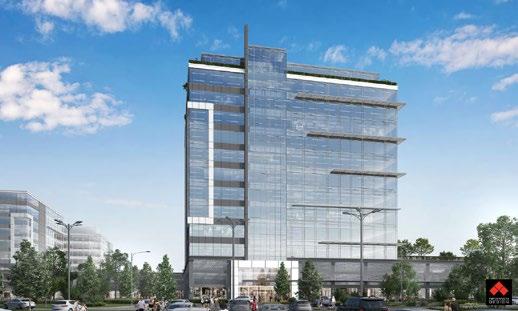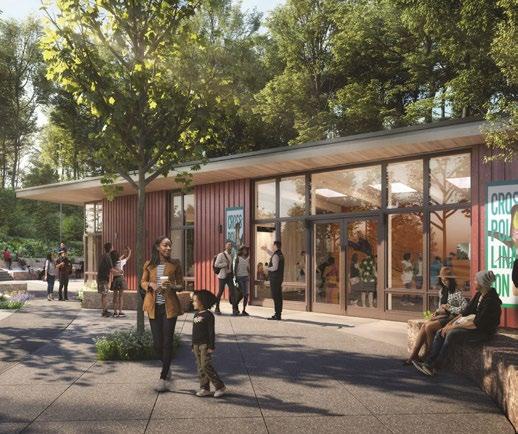
7 minute read
Advancing Clean and Resilient Buildings and Carbon Neutrality Across New York State
3ADVANCING CLEAN AND RESILIENT BUILDINGS AND CARBON NEUTRALITY ACROSS NEW YORK STATE
by Susanne E. DesRoches, Vice President of Clean and Resilient Buildings, NYSERDA

DeKalb Commons, Buildings of Excellence Competition. Rendering by Nightnurse Images courtesy of Magnusson Architecture and Planning. New York State’s nation-leading climate agenda is the most aggressive climate and clean energy initiative in the nation, calling for an orderly, just, and equitable transition to clean energy that creates jobs and continues fostering a green economy. The Climate Leadership and Community Protection Act (the Climate Act) puts New
York on a path to achieve its mandated goal of a zero-emission electricity sector by 2040. This includes 70 percent renewable energy generation by 2030, reducing greenhouse gas emissions by 85 percent from 1990 levels by 2050, and reducing on-site energy consumption by 185 trillion BTUs of end-use energy savings by 2025.
New York is also supporting Governor Hochul’s plan to achieve two million climate-friendly, electrified, or electrification-ready homes by 2030, with a minimum of 1 million electrified homes and up to 1 million electrification-ready homes. More than 800,000 low-to-moderate income houses are expected to receive clean energy upgrades under this plan. This plan is supported by a series of legislative and policy actions that include all new building construction reaches zero-emissions by 2027.
These policies and goals are supported by New York’s unprecedented investments to ramp-up clean energy to reduce buildings emissions, increase large-scale renewable and transmission projects, and scale up solar and transportation initiatives across the state. At least 35 percent, with a goal of 40 percent, of the benefits of clean energy investments are directed to disadvantaged communities. These investments
are supporting nearly 158,000 jobs in New York’s clean energy sector in 2020 and will help New York to reach economy wide carbon neutrality. Buildings account for more than a third of the economy-wide greenhouse gas emissions in New York State, and most of the State’s current building stock was constructed before energy codes were passed and were, therefore, not constructed to be energy efficient. Decarbonized buildings and communities will help improve building resiliency, occupant health and productivity, revitalize communities, and continue the transition to a clean energy economy. Since the launch in 2019, two rounds of the Competition have awarded over $31 million to over 40 projects across both the market rate and affordable housing communities. The Competition continues to show innovation, replicability, scalability, and the advancing shift to carbon neutrality and resiliency in the New York State building stock. All of Round Two’s awarded projects are proposed as all-electric buildings, including the first “super tall” project. Round Two also included a partnership with The Architectural League of New York to ensure overall design quality was an important criterion in the evaluation of the projects. Five projects were selected to receive the Blue Ribbon for Design Excellence award (https://www.nyserda. ny.gov/All-Programs/Multifamily-Buildings-of-Excellence/Winners).


Zero Place (Top) and Zero Place Rooftop Seating (Bottom), Buildings of Excellence Competition. Basilica Hudson Industries, Carbon Neutral Community Economic Development Program (CNCED). Rendering Credit: Pelletier de Fontenay
Architects, industry experts, and other members of the design community are some of the key influencers in producing designs in a responsible way. The New York State Energy Research and Development Authority (NYSERDA) partnered with AIA for the one-of-a-kind competition, $40 million Buildings of Excellence Competition (the Competition) (https://www.nyserda. ny.gov/All-Programs/Multifamily-Buildings-of-Excellence) to spur the design and innovation of clean, resilient, and carbon neutral multifamily buildings, that protecting the health, safety, and welfare of the public, all at a predictable cost. Through this effort, architects and developers are working together to advance Governor Hochul’s two-million climate-friendly homes initiative and shape the future of our buildings in this market sector, which represents about 40 percent of projected new building construction in New York (by square footage). The Competition also continues to evolve to meet market needs and support policy goals. The most recently launched Third Round, will do just that, and build off the successes in Rounds One and Two. More focus has been placed on design quality, resiliency, and providing healthier, safer, and more comfortable living conditions for occupants. Round Three added a new component to the Competition, funding early-stage support for design teams to ensure the most clean, resilient, cost-effective, and occupant focused solutions are integrated into projects from the start. Successful Round Three projects are expected to seamlessly integrate these characteristics. NYSERDA partnered with Empire State Development (ESD) and the New York State Department of State’s Downtown Revitalization Initiative (DRI) to administer the companion program to the Competition, Carbon Neutral Community Economic Development Program (CNCED) (https://www.nyserda.ny.gov/ All-Programs/Carbon-Neutral-Economic-Development) to fund projects that will accelerate building decarbonization and economic development in Disadvantaged Communities and Downtown Revitalization Initiative districts. The program also funds commercial and mixed-use facilities that will reduce climate change-causing building emissions, improve the quality of life for residents and visitors, and result in jobs that provide family-sustaining wages and benefits to further support the transition to a clean energy economy.


Tower 3, Carbon Neutral Communities for Economic Development Program. Rendering Credit: Newman Design Group.
Since the launch in 2018, three Rounds of CNCED have awarded $40 million to over 35 projects across the agricultural, civic, college and university, education, and office sectors. Funding has gone to projects that are both individual buildings and large community, campus, or portfolio scaled projects. Eight of the 19 projects awarded in the Third Round, are in disadvantaged communities, which is consistent with the goal for clean energy investments to under resourced communities. Round Three featured New York’s first all-electric, carbon neutral maple syrup operation, located in Canandaigua and North America’s first certified passive warehouse, located in Ulster County. CNCED is another program that shows the shift to a clean and carbon neutral building stock across all building types. Almost 50 percent of the projects across all three Rounds of the program have been adaptive reuse of an existing building to carbon natural performance, with many of these projects being historic structures requiring considerations associated with maintaining the building’s character and heritage. Existing buildings that undergo modernization, will inherently have lower embodied carbon than new construction projects. The most recently launched $10 million Fourth Round will continue to build off the successes of the previous three. The awarded projects continue to show the feasibility of applying clean energy technologies to both new and existing buildings across many different building types, industries, and uses. These projects also often serve as the anchor project for surrounding neighborhood redevelopment and stronger community connectivity. Through the AIA 2030 initiative, AIA continues to prioritize greenhouse gas reductions, resiliency, and occupant indoor health and comfort. NYSERDA is excited to continue this partnership, and look to the collective power of the architectural, development, and construction communities to continue to apply their problem-solving skills and expertise to further clean and resilient solutions that provide healthy living and work-spaces for all New Yorkers. NYSERDA remains impressed by the innovation, interest, and participation in these programs. The awarded projects continue to show that, with leadership and creativity, we can bring affordable, beautiful, clean, and resilient buildings to scale. l

Frederic Church Center, Carbon Neutral Communities for Economic Development Program. Rendering Credit: Architecture Research Office/Nelson Byrd Woltz.
Susanne is NYSERDA’s Vice President of Clean and Resilient Buildings leading the Authority’s work on building decarbonization, advancing programs and policies to deliver a carbon-neutral building stock. Prior to joining NYSERDA in April 2022, she served as Regulatory Director for Energy Policy at the New York City Mayor’s Office of Climate & Sustainability and Mayor’s Office of Climate Resiliency. While there, she was responsible for the City’s energy policy and regulatory affairs at the local, state, and federal levels, and directed the City’s policies and programs designed to adapt regional infrastructure systems to climate change and the City’s efforts to transition to 100 percent clean electricity by 2040. She led the City’s long-term energy planning efforts, which centered on decarbonization while prioritizing a just and affordable energy transition for all New Yorkers. Susanne also led the City’s efforts to ensure climate resiliency was integrated into utility and bulk power system planning and oversaw the development of the NYC Climate Resiliency Design Guidelines. She led the NYC Climate Change Adaptation Task Force, which works to identify climate risks and coordinate adaptation strategies and was a chapter author for the fourth National Climate Assessment. She was previously the Chief of Resilience and Sustainability for the Engineering Department at the Port Authority of New York & New Jersey. Susanne is highly regarded in the clean energy and resilience space. She holds a Bachelor of Industrial Design from Pratt Institute and an MPA in Environmental Science and Policy from Columbia University and is a LEED Accredited Professional. Susanne is on the faculty of Columbia University’s Earth Institute and School of Professional Studies.








